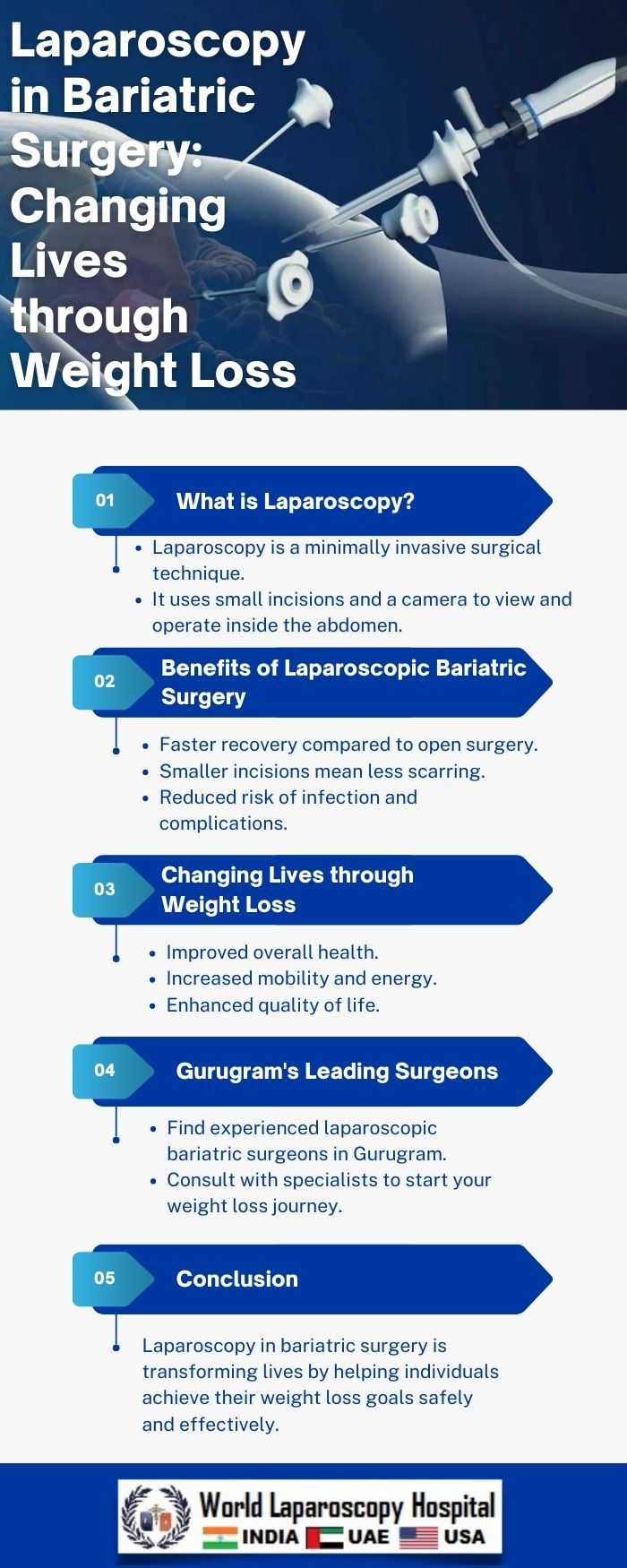Title: Laparoscopy in Bariatric Surgery: Changing Lives through Weight Loss
Introduction
In the bustling city of Gurugram, where I practice as a surgeon, the field of bariatric surgery has witnessed a remarkable transformation in recent years. The advent of laparoscopy has brought about a paradigm shift in the way we approach weight loss procedures, ultimately changing the lives of countless individuals struggling with obesity. In this comprehensive article, we will delve deep into the world of laparoscopy in bariatric surgery, exploring its history, techniques, benefits, and the profound impact it has on patients' lives.

The Evolution of Bariatric Surgery
To understand the significance of laparoscopy in bariatric surgery, it's essential to first recognize the evolution of this medical discipline. Bariatric surgery, or weight loss surgery, has been performed for decades, primarily through open procedures that involved large incisions and prolonged recovery times.
-
Early Days of Bariatric Surgery
- The historical context of bariatric surgery.
- Early techniques and challenges.
-
Advancements in Open Surgery
- Progress in surgical techniques.
- Improved patient outcomes.
The Laparoscopic Revolution
The advent of laparoscopy marked a significant turning point in bariatric surgery. This minimally invasive approach involves the use of small incisions and a camera-equipped laparoscope, enabling surgeons to perform complex procedures with enhanced precision and reduced trauma to the patient's body.
-
Laparoscopy Defined
- Explanation of laparoscopy and its components.
- How it differs from open surgery.
-
Laparoscopic Bariatric Procedures
- Overview of laparoscopic gastric bypass, sleeve gastrectomy, and adjustable gastric banding.
- The suitability of each procedure for different patients.
Benefits of Laparoscopic Bariatric Surgery
The advantages of laparoscopy in bariatric surgery are multifaceted and extend beyond the surgical suite. Patients and surgeons alike benefit from this approach in numerous ways.
-
Reduced Recovery Time
- Comparison of recovery times between laparoscopic and open surgery.
- The impact on patients' return to daily life and work.
-
Minimal Scarring
- The aesthetic appeal of laparoscopy.
- The psychological impact on patients.
-
Lower Risk of Complications
- Fewer postoperative complications with laparoscopy.
- Reduced risk of infections and hernias.
-
Improved Precision
- How laparoscopy allows for better visualization of surgical field.
- Enhanced surgical precision and outcomes.
The Impact on Patients' Lives
The true measure of success in bariatric surgery lies in its transformative effect on patients' lives. Laparoscopic bariatric procedures have played a crucial role in helping individuals overcome obesity and its associated health issues.
-
Weight Loss and Health Benefits
- The significant weight loss achieved through laparoscopic surgery.
- Resolution of obesity-related comorbidities.
-
Improved Quality of Life
- Personal stories of patients whose lives have changed.
- Enhanced self-esteem and mental well-being.
-
Long-Term Success
- The sustainability of weight loss with laparoscopy.
- The importance of lifestyle changes post-surgery.
Challenges and Considerations
While laparoscopy has brought about numerous benefits in bariatric surgery, it is not without its challenges and considerations. Surgeons and patients must be aware of these aspects to make informed decisions.
-
Learning Curve for Surgeons
- The specialized training required for laparoscopic bariatric procedures.
- The importance of experienced surgeons.
-
Patient Selection
- Criteria for selecting suitable candidates for laparoscopic surgery.
- The role of patient education and counseling.
VI. Future Directions in Laparoscopic Bariatric Surgery
The field of laparoscopic bariatric surgery continues to evolve, with ongoing research and technological advancements. The future holds exciting possibilities that may further enhance patient outcomes and expand the reach of these procedures.
-
Emerging Techniques and Technologies
- Robotic-assisted laparoscopy.
- Innovations in surgical instruments.
-
Personalized Medicine
- Tailoring bariatric surgery to individual patient needs.
- The potential for genetic and metabolic profiling.
Conclusion
In Gurugram, as in many parts of the world, laparoscopy has ushered in a new era in bariatric surgery. It has not only improved the technical aspects of these procedures but has also profoundly impacted the lives of countless individuals struggling with obesity. Through reduced recovery times, minimal scarring, and improved precision, laparoscopy has changed the face of weight loss surgery, offering hope and a new beginning for those in need. As we look ahead, the future of laparoscopic bariatric surgery holds even greater promise, ensuring that this transformative journey continues to change lives for the better.

.jpg)




